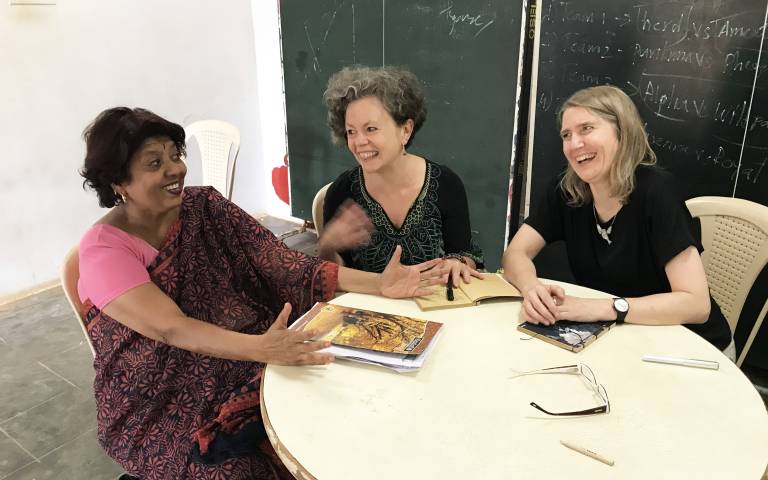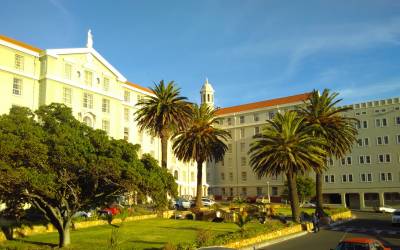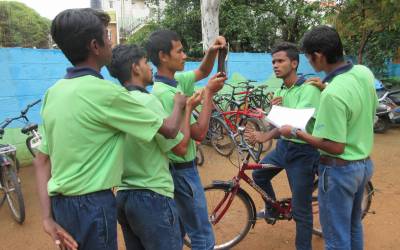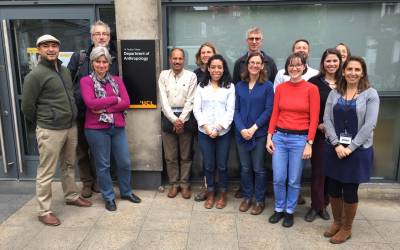Global Engagement Funds: Spotlight on women-led projects
26 March 2018
In honour of this month's International Women’s Day, take a look back at some of the women-led projects supported by the Global Engagement Funds

On 19 March, the 2018/19 Global Engagement Funds opened for application. Each year, between £500 and £2,000 is available to UCL staff looking to collaborate overseas (up to £4,000 for those in the Social & Historical Sciences or Arts & Humanities faculties).
Since their conception in 2015, more than £500,000 has been allocated through the scheme, supporting over 400 UCL academics from 80+ departments in partnering with 464 organisations in 79 countries worldwide, including Qatar, Mauritius, Mumbai, Thailand, France, Sierra Leone and many more.
With International Women’s Day this month, we’re putting some of the women-led projects supported by the Global Engagement Funds in the spotlight.
From a study of the provenance of Islamic ceramics recovered in Doha to a pilot survey of the current knowledge and accessibility of contraceptive methods in Sierra Leone, the projects were many and varied. Here’s a snapshot of some of the international, innovative work:
Dr Emma Wall, Academic Clinical Training Fellow and NIHR Clinical Lecturer, UCL Division of Infection and Immunity

On her decision to apply, Emma said: “I submitted an application as I am planning a fellowship to be based in sub-Saharan Africa and wanted to explore different options through discussion and collaboration.”
Emma travelled to the 2017 Bloomsbury Wellcome Trust Biannual Scientific meeting in Malawi, before heading on to the University of Cape Town.
“The funds enabled me to meet multiple potential collaborators and view various research sites and labs to decide where best to site my study,” she explained.
“The face to face meetings and actual site visit to each place were invaluable and meant that I could present my data and then we could discuss in detail. Seeing the actual hospitals and labs was also invaluable.”
With the funds open for 2018/19, Emma urged others to seize the opportunity themselves: “I would definitely recommend others to apply. It was a straightforward process and I’ve benefited hugely from the support.”
Rebecca Wilson, Initial Teacher Education: Teaching Technology Specialist, UCL Institute of Education and Theo Bryer, Lecturer, Culture, Communication & Media, UCL Institute of Education
In July 2017, UCL Institute of Education’s Rebecca Wilson and Theo Bryer used their successful bid for Global Engagement Funds to run drama and filmmaking sessions with young people in and around Bengaluru – a trip we reported on last year.
For two weeks, they collaborated with Sangam, a local education centre, and worked with young people from Parikrma Humanity Foundation School, Delhi Public School and Baale Mane girls’ home.

“Our aim was to find out how the approaches to drama and filmmaking using iPads that we have developed worked in these very different contexts,” said Theo.
Through the project, she explained: “We fostered ongoing links with the Sangam Education Centre, local schools and teachers in the area of Bengaluru with the hope of further collaboration.”
“We’ve already drawn on the outcomes of this project for a workshop, lecture and presentation in the course of our teaching and work – and will continue to do this.”
Dr Emily Woodhouse, Lecturer in Interdisciplinary Environmental Anthropology/ Human Ecology, UCL Department of Anthropology
Emily and her team used the funding to bring over WWF's Muhammad Waseem and Dipesh Joshi from South Asia, both of whom work on improving conservation policy and practice, in order to build a stronger presence from the Global South into their research and impact activities.
This allowed Emily to build on a Research Councils UK-funded project aiming to combine evidence and expert knowledge on the social and human well-being impacts of protected areas, and their relation to ecological effectiveness.

“This face-to-face contact allowed open discussion and debate – [which is] invaluable in the development of policy-relevant research that will have meaningful impacts in the Global South.”
The initial workshop – complete with input from Global South NGOs – enabled Emily and team to develop questions relevant to the South Asian context, finalise synthesis methods and criteria and develop specific strategies and tools for engagement with the research through global networks.
According to Emily: “The global partners supported by this grant continue to be involved in the research process, and this will ultimately help us to promote, disseminate and mainstream the findings into policy and practice that promotes the sustainable governance of protected areas.”
To find out more about previous funded projects, including Dr Rachel Rosen and Dr Sarah Crafter’s visit to the Calais ‘Jungle’ and Professor Monica Lakhanpaul’s visit to an NGO in Mumbai, visit the Global Engagement Funds case studies.
The current round of Global Engagement Funds close at 9am on Thursday 17 May 2018.
 Close
Close

